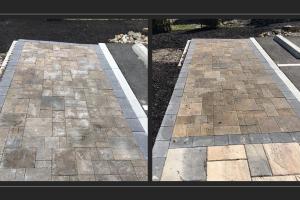Effective Techniques for Removing Efflorescence from Pavers

-
Quick Links:
- Understanding Efflorescence
- Causes of Efflorescence
- Prevention Strategies
- Removal Techniques
- Step-by-Step Guide to Removing Efflorescence
- Case Studies
- Expert Insights
- FAQs
Understanding Efflorescence
Efflorescence is a common issue that affects many outdoor surfaces, particularly pavers. It appears as a white, powdery substance on the surface of the pavers, caused by the migration of soluble salts present in the materials used to construct the pavers. When water evaporates from the surface, these salts are left behind, creating the unsightly efflorescence.
Causes of Efflorescence
Understanding what causes efflorescence is vital in addressing the issue effectively. Here are the main contributors:
- Moisture: Excess moisture in the ground or poor drainage can lead to efflorescence.
- Salts: The presence of soluble salts in the soil or paver materials.
- Temperature Fluctuations: Rapid changes in temperature can exacerbate efflorescence issues.
Prevention Strategies
Preventing efflorescence is often easier than removing it once it appears. Here are some effective prevention strategies:
- Proper Drainage: Ensure that water drains away from your pavers to avoid excess moisture.
- Sealants: Applying a high-quality sealant can help to block moisture from penetrating the pavers.
- Choosing the Right Materials: Opt for pavers with low salt content.
Removal Techniques
Removing efflorescence from pavers can be accomplished through various methods. Here are some popular techniques:
- Water Rinsing: Using a hose to rinse off the efflorescence can be effective for light cases.
- Vinegar Solution: A mixture of vinegar and water can help dissolve the efflorescence.
- Commercial Products: There are various commercial efflorescence removers available that can be highly effective.
Step-by-Step Guide to Removing Efflorescence
To assist you in effectively removing efflorescence from your pavers, we’ve compiled a comprehensive step-by-step guide:
- Gather Your Supplies: You will need a stiff-bristle brush, water, vinegar or a commercial cleaner, and a hose.
- Brush the Affected Area: Use the stiff-bristle brush to scrub the affected areas gently.
- Prepare Your Cleaning Solution: If using vinegar, mix one part vinegar to three parts water.
- Apply the Solution: Pour your cleaning solution over the pavers.
- Scrub Again: After letting the solution sit for about 10-15 minutes, scrub the area again.
- Rinse Thoroughly: Use water to rinse off the cleaning solution and any remaining efflorescence.
- Allow to Dry: Let the area dry completely, and inspect for any remaining stains.
Case Studies
To illustrate the effectiveness of these methods, here are some real-world examples of homeowners who faced efflorescence issues:
Case Study 1: The Suburban Homeowner
A homeowner in the suburbs found that their pavers were covered in efflorescence after a heavy rain. They attempted the vinegar solution and were amazed at the results, seeing almost immediate improvement.
Case Study 2: The Commercial Property
A local business owner had efflorescence on their outdoor patio. They opted for a commercial cleaner and reported that the pavers looked brand new after just one application.
Expert Insights
We spoke with landscaping experts to gather their insights on the best practices for removing and preventing efflorescence:
"Prevention is key when it comes to efflorescence. Regular maintenance and proper drainage make a world of difference." - Jane Doe, Landscaping Expert.
FAQs
1. What is efflorescence?
Efflorescence is a white, powdery substance that appears on the surface of pavers due to soluble salts.
2. How can I tell if my pavers have efflorescence?
Look for white, chalky spots on the surface of the pavers, especially after rain.
3. Is efflorescence harmful to my pavers?
While efflorescence itself isn't harmful, it can indicate moisture issues that may damage the pavers over time.
4. Can I prevent efflorescence?
Yes, proper drainage and sealants can help prevent efflorescence from forming.
5. What should I do if the vinegar solution doesn't work?
If vinegar doesn't work, consider using a commercial efflorescence remover.
6. How often should I clean my pavers?
Regular maintenance, including cleaning, should be done at least once a year or as needed.
7. Can I use bleach to remove efflorescence?
Bleach is not recommended as it can damage the pavers and surrounding plants.
8. What time of year is best for cleaning pavers?
Spring and fall are ideal times to clean pavers, avoiding extreme temperatures.
9. Is it necessary to seal pavers after cleaning?
Yes, sealing pavers after cleaning can help prevent future efflorescence and enhance durability.
10. Where can I find commercial efflorescence removers?
Most home improvement stores carry a variety of commercial efflorescence removers.
By following these guidelines and techniques, you can effectively address the issue of efflorescence on your pavers, ensuring they remain beautiful and functional for years to come.
For more information, visit HGTV or The Spruce for additional insights and options.
Random Reads
- How to adjust toilet tank handles
- How to add colors to text in minecraft
- Free ways to convert jpg to png
- Free calling facebook messenger
- How to estimate roofing materials
- How to kill vittoria vici in skyrim
- How to buy a gift subscription on netflix
- How to bury valuables
- How to fix your frozen samsung galaxy tablet
- How to flash a chimney